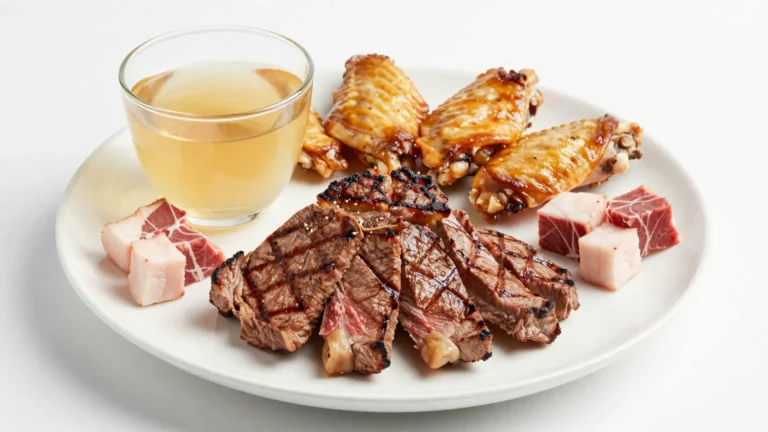As the world of nutrition continues to evolve, the Carnivore Diet and the Keto Diet have gained significant attention in recent years. Both diets promise weight loss, improved health, and increased energy levels. However, they differ significantly in their approach to food consumption. In this article, we will delve into comparing Carnivore vs Keto Diet details such as their nutritional content, dietary patterns, cultural significance, and health implications.
Learn About Carnivore and Keto Diet

Carnivore Diet basics
- Origins: The Carnivore Diet was popularized by Shawn Baker, a former orthopedic surgeon, and is based on the ancestral health movement. It argues that humans are biologically adapted to eat what our pre-agricultural ancestors ate.
- Definition: The Carnivore Diet is an ultra-low-carb diet that consists almost exclusively of animal products, with some versions allowing small amounts of dairy
- Key Components: Meat (beef, pork, poultry), fish, eggs, and some versions allow dairy products like butter, cheese, and yogurt. No plant foods are consumed.
- Eating Patterns: Unlike the Keto Diet, the Carnivore Diet has no specific macronutrient ratio or calorie restriction. Instead, it focuses on consuming only animal-based products.
Ketogenic (Keto) Diet basics
- Origins: The Keto Diet was first used in the 1920s to treat epilepsy and later popularized for weight loss and overall health improvement.
- Definition: The Keto Diet is a high-fat, moderate-protein, and very low-carb diet that typically includes a mix of animal products, healthy fats, and vegetables.
- Key Components: High fat (65-75%), moderate protein (20-35%), and very low carb (5-10%) intake. Foods include meat, fish, eggs, high-fat dairy, oils, avocados, nuts, seeds, and low-carb vegetables and fruits.
- Eating Patterns: The Keto Diet aims to induce a state of ketosis by restricting carbohydrate intake, leading the body to burn fat for energy instead of glucose.
Carnivore vs Keto Diet: Compare Nutritional Content
Nutritional content refers to the composition of nutrients in a food or diet. This includes macronutrients (protein, carbohydrates, fats), micronutrients (vitamins and minerals), fiber, water, and other bioactive compounds like phytochemicals and antioxidants. Let’s compare the average daily macronutrient and micronutrient intakes of both diets.
Carnivore Diet Nutrition
- Macronutrients: 100% calories from fat (derived mostly from meat), moderate protein (~25% of total calories), no carbohydrates.
- Micronutrients: Vitamin B12, biotin, and choline are abundant. However, vitamin C, fiber, magnesium, folate, and other micronutrients may be insufficient due to the exclusion of plant foods.
Keto Diet Nutrition
- Macronutrients: 70% calories from fat (derived from meats, dairy, oils), 25% protein (~150g daily), and 5% carbohydrates (<20g net carbs).
- Micronutrients: The Keto Diet provides a balanced range of vitamins and minerals due to the inclusion of low-carb vegetables, fruits, nuts, and seeds. However, it may still fall short in some micronutrients like magnesium, folate, and vitamin C if not properly planned.
Carnivore vs Keto Diet: Compare Dietary Patterns
Dietary patterns refer to the overall combination of foods and beverages consumed over time, reflecting an individual’s usual eating habits. Unlike focusing on single nutrients or specific foods, dietary patterns take into account the variety, frequency, and amounts of foods typically eaten together. Here is a a comparison of Keto and Carnivore dietary pattern:
Carnivore Diet Dietary Pattern
- Variety: Limited food choices due to the exclusion of plant foods.
- Plant-based vs Animal-based: 100% animal-based foods.
- Restrictions/Eliminations: No plant foods, including fruits and vegetables, grains, legumes, nuts, seeds, and most dairy products (except butter, cheese, and yogurt).
Keto Diet Dietary Pattern
- Variety: More varied food choices due to the inclusion of low-carb vegetables, fruits, nuts, seeds, and select dairy products.
- Plant-based vs Animal-based: Primarily animal-based with some plant foods allowed.
- Restrictions/Eliminations: Significant restriction on carbohydrates (<20g net carbs daily), including grains, starchy vegetables, legumes, many fruits, sugars, and high-carb dairy products like milk.
Cultural and Social Aspects of Carnivore and Keto Diet
Cultural and social aspects are crucial components when considering dietary patterns, as they significantly influence food choices, eating behaviors, and overall health. These factors can impact individuals at both the personal level (e.g., family traditions) and broader community or societal levels (e.g., cultural norms).
Here’s a comparison of some aspects of the Keto and Carnivore diets:
Carnivore Diet:
- Cultural fit: May fit well with cultures that emphasize meat-heavy meals but might not align with plant-based traditions.
- Social suitability: Following a strict Carnivore Diet at social events or gatherings could limit food choices and potentially lead to unwanted attention.
Ketogenic Diet:
- Cultural fit: More versatile, as it can incorporate various foods from different cultures when properly planned.
- Social suitability: Easier to follow at social events and gatherings due to its wider range of acceptable foods. However, it may still require careful planning to avoid high-carb options.
Carnivore vs Keto Diet Short-Term Effects
Short-term effects refer to the immediate or temporary changes that occur soon after beginning a specific diet or lifestyle modification. These effects can vary from person to person depending on factors such as individual physiology, overall health, adherence to the diet, and other external factors. Short-term effects of dietary interventions typically last for a few days to several weeks before stabilizing or becoming more long-lasting. Here is a comparison of short-term effects for both diets:
Short-term effects of Carnivore Diet:
- Rapid Weight Loss: Due to reduced calorie intake, many people experience quick weight loss in the initial stages.
- Improved Digestion: Eliminating plant-based foods can lead to improved digestive symptoms, particularly for individuals with conditions like IBS or IBD.
- Increased Ketones: As with the Keto Diet, the Carnivore Diet also induces ketosis, leading to increased ketone production and blood levels.
- Reduced Appetite: The high-protein and high-fat content can promote feelings of fullness and reduced hunger.
- Keto Flu Symptoms (though less severe): Some individuals may experience temporary fatigue, headache, or foggy brain as their body adapts to using fat for fuel.
Short-term effects of Keto Diet:
- Weight Loss: Initially, many people experience water weight loss due to glycogen depletion. Later, they may continue losing weight due to calorie restriction.
- Improved Blood Sugar Control: Reducing carbohydrate intake helps stabilize blood sugar levels and improve insulin sensitivity.
- Keto Flu Symptoms: Some individuals may experience temporary side effects like fatigue, headache, foggy brain, nausea, and increased hunger as their body adapts to ketosis.
- Bad Breath: A metallic taste in the mouth or fruity-smelling breath can occur due to increased acetone production.
- Constipation: The lack of fiber from carbohydrates may lead to constipation for some individuals.
- Metallic Taste in Mouth
- Ketones on Breath
- Improved Mental Clarity (for some individuals)
- Increased Energy Levels (once adapted to ketosis)
While both diets share some short-term effects, the Carnivore Diet may lead to more rapid weight loss and improved digestion due to its exclusion of plant-based foods. However, it also carries a higher risk of nutrient deficiencies and potential health risks compared to the Keto Diet. The Keto Diet, on the other hand, allows for greater flexibility in food choices while still promoting ketosis. As always, it’s essential to consider individual needs and consult with a healthcare provider before starting any new diet.
Carnivore vs Keto Diet Long-Term Effects
Long-term effects refer to the sustained impacts or changes that occur after following a specific diet or lifestyle intervention for an extended period, typically beyond several months. These effects can vary greatly depending on factors such as individual physiology, adherence to the diet, overall health, and other external influences.
Both the Carnivore Diet and Ketogenic Diet have been studied for their potential long-term effects, although it’s important to note that research on these diets is still evolving, particularly regarding long-term impacts. Here’s a comparison of some potential long-term effects associated with each diet:
Long-Term Effects of Carnivore Diet:
- Weight Loss and Body Composition: Some studies and anecdotal reports suggest that the Carnivore Diet may lead to sustained weight loss and improved body composition over time. However, more research is needed to confirm these findings and determine optimal duration and safety.
- Improved Metabolic Health: A few case studies and testimonials indicate that some individuals experience improvements in metabolic health markers like blood sugar control, insulin sensitivity, and lipid profiles on the Carnivore Diet. Nevertheless, larger-scale studies are required to validate these observations.
- Potential Nutrient Deficiencies: Due to the exclusion of all plant-based foods, long-term adherence to a strict Carnivore Diet may increase the risk of certain nutrient deficiencies, such as vitamin C, folate, and fiber. Supplementation might be necessary to maintain adequate nutritional balance.
- Gastrointestinal Issues: While some people report improved digestion and bowel movements on the Carnivore Diet, others may experience long-term gastrointestinal discomfort or disorders due to factors like high fat intake, low fiber intake, or shifts in gut microbiota.
- Kidney Health: Long-term, high-protein diets like the Carnivore Diet could potentially impact kidney function, although more research is needed to determine if this effect is clinically significant for most individuals.
- Social and Psychological Impact: The restrictive nature of the Carnivore Diet might lead to social isolation or psychological stress in some people due to limitations on shared meals, dining out, or special occasions.
Long-Term Effects of Keto Diet:
- Weight Loss and Body Composition: Numerous studies have shown that the Ketogenic Diet can promote weight loss and improve body composition over time, although results may vary among individuals.
- Improved Metabolic Health: The Ketogenic Diet has been demonstrated to enhance metabolic health markers like blood sugar control, insulin sensitivity, and lipid profiles in various populations, with some improvements sustained long-term.
- Neurological and Cognitive Benefits: Some studies suggest that the Ketogenic Diet may offer long-term benefits for neurological conditions (e.g., epilepsy) and cognitive function due to its neuroprotective effects and modulation of neurotransmitters.
- Potential Kidney Stones and Dehydration: Long-term use of the Ketogenic Diet has been linked to an increased risk of kidney stones, dehydration, and other potential side effects like electrolyte imbalances (e.g., hyponatremia).
- Bone Health Concerns: Prolonged use of the Ketogenic Diet may negatively impact bone health due to factors like calcium deficiency, vitamin D deficiency, or excessive protein intake, although more research is needed to determine the clinical significance of these effects.
- Halitosis and Gastrointestinal Issues: Some individuals on the Ketogenic Diet report long-term gastrointestinal discomfort, halitosis (bad breath), or other side effects due to factors like increased fat consumption, low-carb diet transitions, or shifts in gut microbiota.
Both diets have potential benefits for weight loss, metabolic health improvements, and other specific uses cases. However, they also come with their own set of risks and challenges that may not be suitable for everyone in the long term.
The Carnivore Diet is more restrictive than the Ketogenic Diet, which allows for some plant-based foods and carbohydrates (albeit in limited amounts). As a result, individuals on the Carnivore Diet might face a greater risk of nutrient deficiencies or social isolation compared to those following the Ketogenic Diet.
On the other hand, the Ketogenic Diet might have a higher potential for long-term side effects like kidney stones or bone health concerns due to factors like increased fat consumption, low-carb diet transitions, or shifts in gut microbiota.
Ultimately, the choice between these diets will depend on individual needs, preferences, and healthcare considerations. It’s essential to consult with a qualified healthcare professional before starting any new dietary regimen, especially when considering long-term adherence.
Regular monitoring and follow-ups with healthcare providers can help track long-term effects and make adjustments as needed to maintain optimal health and well-being while minimizing potential risks or side effects.
Carnivore vs Keto Diet: Pros and Cons
| Carnivore Diet | Keto Diet | |
|---|---|---|
| Pros |
|
|
| Cons |
|
|
Conclusion
Both the Carnivore Diet and Ketogenic Diet offer unique benefits and drawbacks. The Carnivore Diet’s simplicity and potential metabolic advantages might appeal to those seeking weight loss or specific health improvements, despite its limited food variety and uncertain long-term effects. Conversely, the Keto Diet offers more dietary flexibility and better-researched outcomes, although it may come with higher saturated fat intake and a longer adaptation period.
It is essential to consult healthcare professionals before starting any restrictive diet, especially considering the potential risks associated with these plans. Both diets should ideally be guided by knowledgeable practitioners experienced in low-carb or carnivore nutrition to minimize adverse effects and maximize benefits tailored to individual needs.



